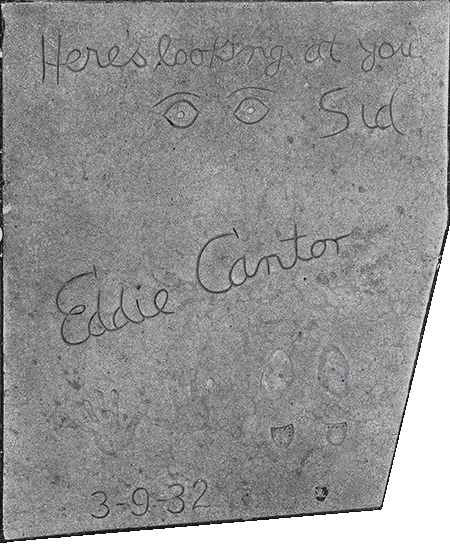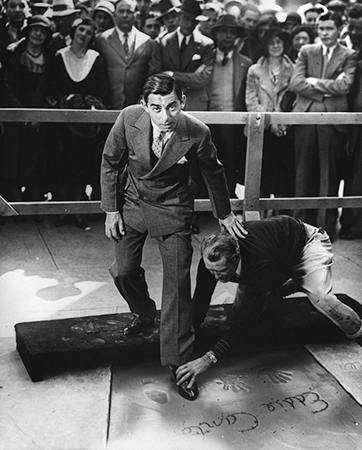 |
 |
|
|
| Eddie Cantor |
 |
| Forecourt Ceremony held on Wednesday, March 9, 1932 |
| |
Born: Edward Isreal Itzkowitz, September 21, 1892, in New York City, New York
Age at the time of the ceremony: 39
Died: October 10, 1964, in Beverly Hills, California, age 72 |
| |
Eddie Cantor was a comic, singing vaudevillian, who also wrote many of his songs. Elevated to the Ziegfeld Follies, Cantor made the leap to musical talking pictures and radio, were he became very popular. His place in history is assured by his being the first overtly Jewish comedian to break into the Big Time, and for being a well-known humanitarian.
Born to Russian-Jewish immigrant parents, both of whom died before he was two, "Izzy" was raised by his maternal grandmother, Esther Kantrowitz. When she sent him to camp one summer, the clerk signing him in wrote his name down as "Kantor" which, after changing the "K" to a "C," became Izzy's Cantor's name.
Izzy, fascinated with the stage, entered and won all the local talent shows. He got a job as singing waiter at the Coney Island Saloon, where Jimmy Durante accompanied him on the piano. Cantor made his vaudeville debut in 1907. Gus Edwards cast Cantor in his 1912 show Kid Kabaret, where he introduced his "blackface" character, "Jefferson."
Cantor married Ida Tobias in 1914, when he was
22. Together, they produced five daughters, a situation which Eddie (Ida thought that "Izzy" wasn't a good name for a performer) used in his stage act for many years — his troubles with having five unmarriageable daughters.
Eddie Cantor teamed up with Al Lee, and had a successful run as "Cantor and Lee" on the vaudeville circuit. So successful, that Florence Ziegfeld gave Cantor a spot in his Midnight Frollic in 1917. Cantor was featured in every edition of The Ziegfeld Follies from 1917 to 1927, appearing in comedy sketches with the likes of Will Rogers, Fanny Brice and W.C. Fields. He also had time to write and star in the musicals Kid Boots (1923) and Whoopee! (1928). Cantor defied Ziegfeld with his involvement in the forming of the Actors Equity trade union in 1919.
Cantor wrote several songs which have entered the American consciousness:
"Makin' Whoopee," "Yes! We Have No Bananas," "If You Knew Susie," "How Ya Gonna Keep 'em Down on the Farm (After They've Seen Paree?)" and "Merrily We Roll Along." Cantor was a popular performer on radio, beginning in 1922. He was the host of the hour-long The Chase and Sanborn Hour on NBC from 1931 to 1934. He made many appreances on radio all throughout the 1930s and 1940s.
Eddie Cantor made several silent short films for the New York motion picture studios while headlining on Broadway, including a feature-length version of Kid Boots for Famous Players-Lasky in 1926. Sam Goldwyn brought Cantor out to Hollywood to make the talkie / Technicolor film of Whoopee! (released in October 1930). This was followed by several popular films: Palmy Days (released in October 1931), The Kid From Spain (released in November 1932), Roman Scandals (which World Premiered at the Chinese in November 1933), Kid Millions (which played the Chinese in Janaury 1935), and Ali Baba Goes to Town (played the Chinese in November 1937).
Cantor was a critical influence at the forming of the Screen Actors Guild, founded in 1933. He served as SAG's second president from 1933 to 1935 (the Hollywood studios did not agree to negotiate with SAG until 1937).
In 1935, Cantor became instrumental in helping the National Foundation for Infantile Paralysis launch its famous "The March of Dimes" fundraising campaign for polio victims (Cantor "coined" the phrase "The March of Dimes" himself — as a take off on the popular
The March of Time newsreels).
During the World War II years, Cantor appeared in films such as: Forty Little Mothers (released in April 1940), Thank Your Lucky Stars (released in September 1943), Show Business (released in May 1944) and Hollywood Canteen (released in December 1944). After the war, Cantor became active in television, becoming a host on The Colgate Comedy Hour from 1950 to 1954, where he famously championed a young singer named Sammy Davis, Jr. A heart attack brought the Colgate gig to an end. He continued appearing as a guest on many television shows. His film bio, The Eddie Cantor Story, was released in 1953.
Following the death of their daughter Marjorie, the Cantor's health broke. Ida passed in 1962, with Eddie dying of a second heart attack in 1964. He was
72. |
|
|
|
|
| |
 |
 |
| Grauman's Chinese Theatre, Hollywood, California. Eddie Cantor Forecourt block. Executed by Jean Klossner, Wednesday, March 9, 1931. 48 x 58 inches overall. |
 |
 |
 |
| Grauman's Chinese Theatre, Hollywood, California. Eddie Cantor Forecourt ceremony, Wednesday, March 9, 1932. Cantor is assisted in making his impressions by cement artist Jean Klossner. |
|
|